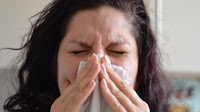Covid Symptoms: Is it a Cold, Flu or Coronavirus?
Autumn is coming to the Northern hemisphere, children are going back to school and coughing, sneezing or runny noses are also back in our households. If you have any of those symptoms, you may also worry that you have caught the coronavirus. You can watch this short BBC News video (1':51") below to find out the differences between these three respiratory illnesses. It is not very difficult, and there are automatic subtitles, so it is recommended for B2 students and above.
If you want more information, you can read the written version of the story here, there are more new words, and many links to other related health stories. Some of the new words are: to fight off, a thermometer, chest, armpit, to tuck, to tug, squeeze, muscle aches, chills, tiredness, a stuffed nose, a heavy cold, to feel unwell, a coughing fit, shortness of breath, diarrhoea, [sneeze] droplets, the [flu] jab, the run-up [to winter], to present with [respiratory symptoms], a [skin] rash, a mild/ severe [symptom], [to feel] breathless.
You will come across basic health vocabulary like: a blocked nose, a runny nose, a sore throat, a cough, flu, (a) temperature, (a) fever, to self-isolate with your household, sneezing, to catch your sneeze, the spray, to infect [others], tissues, a loss of taste, a coughing episode, to have trouble breathing, to spread [covid 19], a nasty cold, to put you down, social distancing, masks, handy.




Comments
Post a Comment